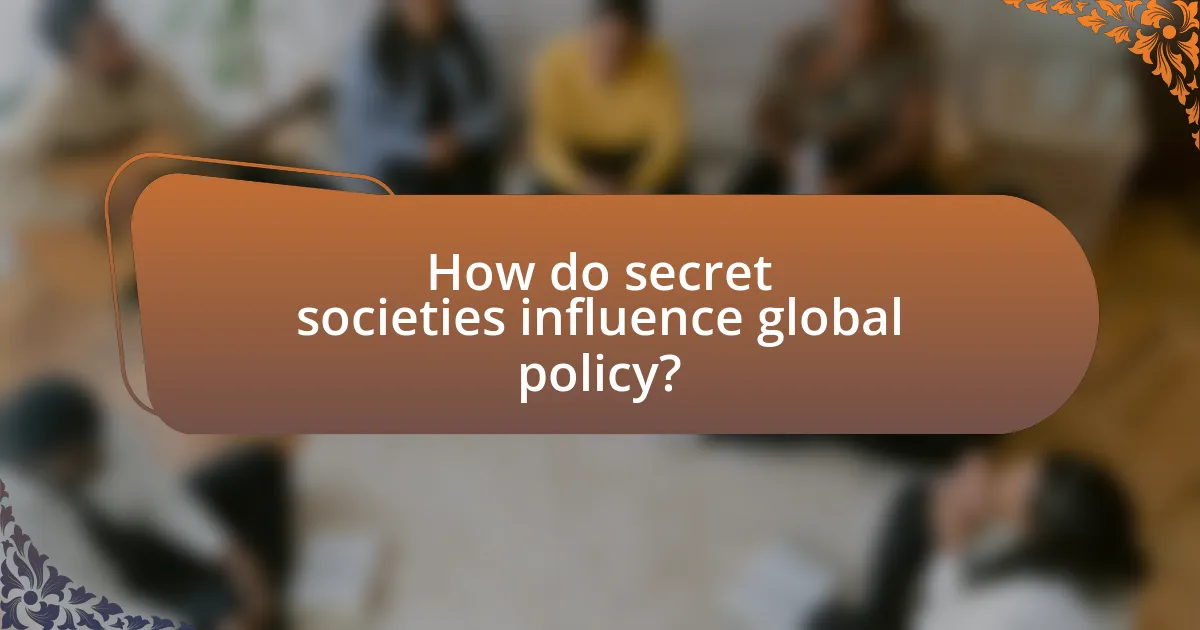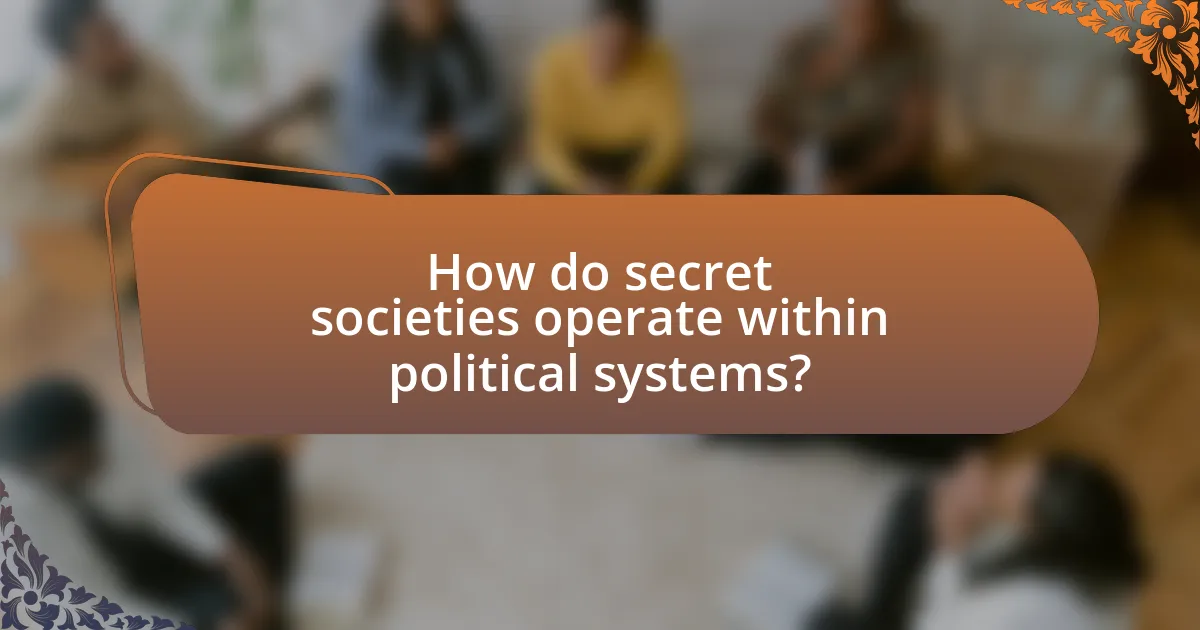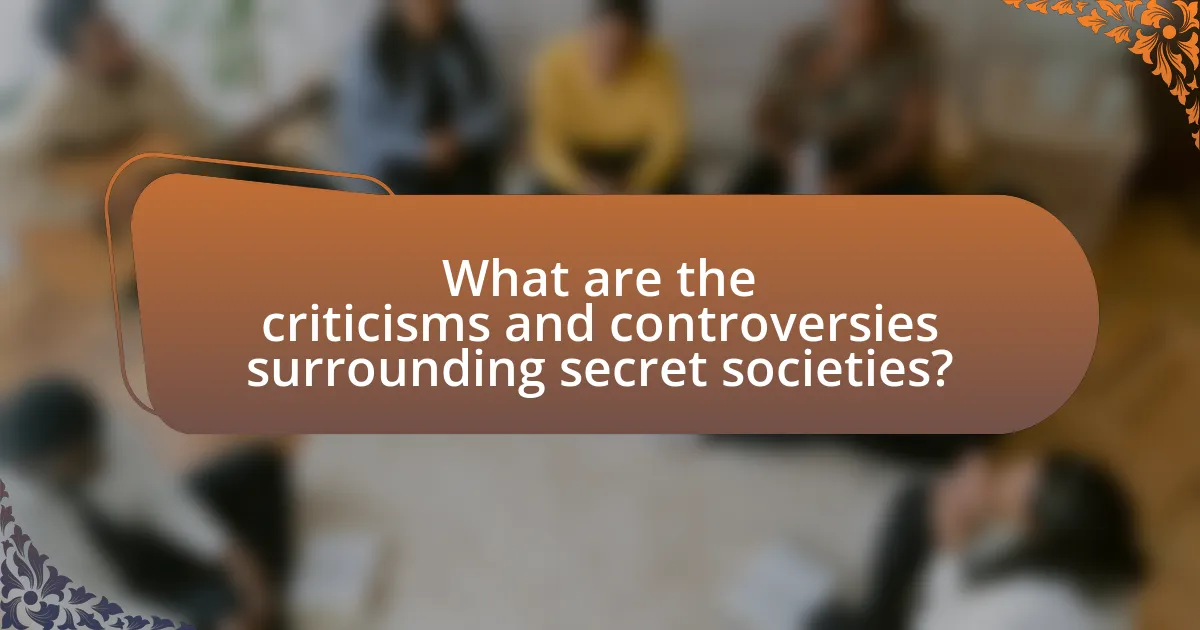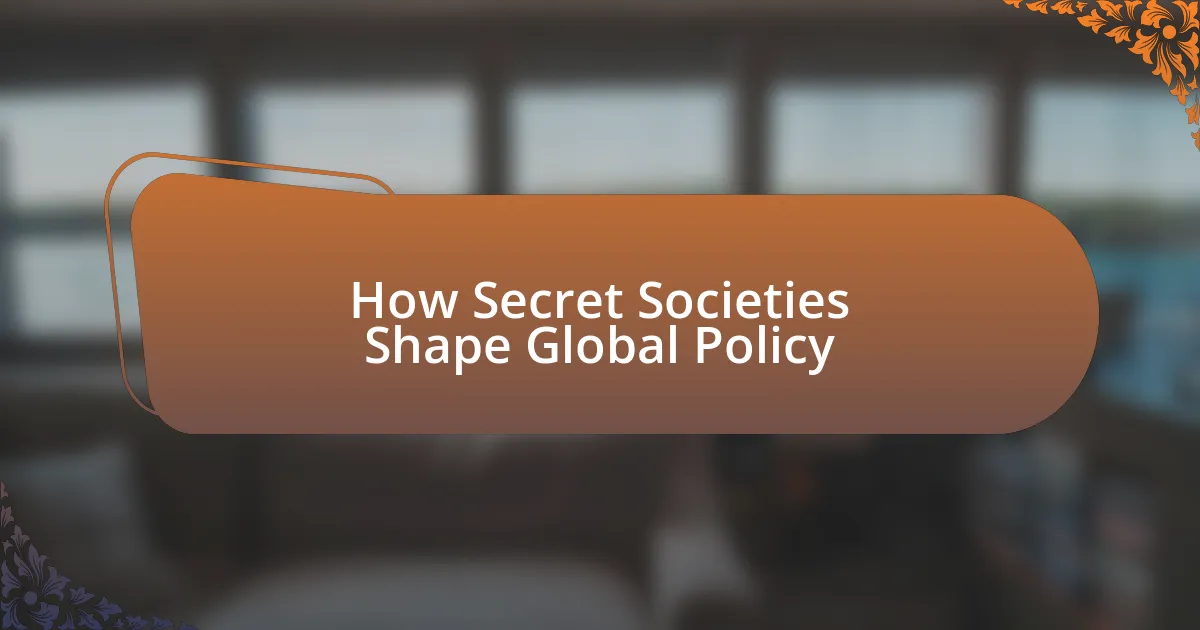Secret societies, such as the Freemasons, Illuminati, and Bilderberg Group, play a significant role in shaping global policy through networking, lobbying, and the dissemination of ideas among influential members from various sectors. These organizations have historical roots dating back to ancient civilizations and have been instrumental in major political events, including the American and French Revolutions. Their influence is exerted through strategic alliances, information control, and the promotion of specific agendas, often operating outside public scrutiny, which raises ethical concerns regarding transparency and accountability in governance. The article explores the mechanisms of influence employed by these societies, their historical impact on political landscapes, and the implications of their activities for democracy and public policy.

How do secret societies influence global policy?
Secret societies influence global policy through networking, lobbying, and the dissemination of ideas among influential members. These organizations often consist of powerful individuals from various sectors, including politics, business, and academia, who collaborate to shape agendas and policies that align with their interests. For instance, the Bilderberg Group, which includes political leaders and business executives, meets annually to discuss global issues, impacting decision-making processes in various countries. Additionally, historical examples such as the Freemasons have shown how secretive networks can facilitate political influence by fostering relationships that lead to policy changes.
What are the historical origins of secret societies?
The historical origins of secret societies can be traced back to ancient civilizations, where they emerged as exclusive groups that sought to protect knowledge and influence societal structures. For instance, the Eleusinian Mysteries in ancient Greece, which began around 1500 BCE, were secret religious rites that promised initiates special knowledge and a deeper understanding of life and death. Similarly, during the Middle Ages, various guilds and fraternal organizations, such as the Freemasons founded in the late 16th century, formed to provide mutual support and promote shared interests among members while often operating under a veil of secrecy. These societies often arose in response to political, social, or religious oppression, allowing members to connect and collaborate outside of public scrutiny, thereby shaping their communities and, eventually, global policies through their networks and influence.
How did early secret societies shape political landscapes?
Early secret societies significantly influenced political landscapes by fostering networks of power and facilitating the exchange of revolutionary ideas. For instance, the Freemasons, established in the late 16th century, played a crucial role in the Enlightenment, promoting values such as liberty and equality, which directly impacted the American and French Revolutions. Their clandestine meetings allowed members to strategize and mobilize against oppressive regimes, thereby altering governance structures. Additionally, the Illuminati, founded in 1776, aimed to promote rationalism and secularism, challenging the authority of monarchies and the church, which contributed to the rise of democratic ideals in Europe. These societies often included influential figures, such as politicians and intellectuals, who utilized their connections to effect change, demonstrating the tangible impact of secret societies on political evolution.
What role did secret societies play in major historical events?
Secret societies have played significant roles in major historical events by influencing political decisions, social movements, and cultural shifts. For instance, the Freemasons were instrumental in the American Revolution, providing a network of support and shared ideals among key figures like George Washington and Benjamin Franklin. Similarly, the Illuminati, though often shrouded in myth, is believed to have influenced Enlightenment thought and the subsequent political revolutions in Europe. The role of these societies often involved clandestine meetings and the dissemination of revolutionary ideas, which helped shape the course of history. Their impact is evidenced by the way they fostered collaboration among influential leaders, ultimately leading to significant societal changes.
What mechanisms do secret societies use to exert influence?
Secret societies exert influence through a combination of networking, secrecy, and strategic positioning within political and economic systems. These organizations often leverage their exclusive membership to create powerful alliances that can sway decision-making processes. For instance, members may hold key positions in government, business, or academia, allowing them to promote specific agendas or policies that align with the society’s interests. Historical examples include the Freemasons and the Illuminati, which have been linked to significant political events and decisions throughout history, demonstrating their capacity to shape global policy. Additionally, the use of rituals and shared beliefs fosters loyalty and commitment among members, further solidifying their collective influence in various spheres.
How do networking and connections facilitate their power?
Networking and connections facilitate power by enabling individuals and groups to access resources, information, and influence that are not available to outsiders. These relationships create a web of support that can amplify one’s voice and authority in decision-making processes. For instance, members of secret societies often leverage their networks to gain strategic advantages in political, economic, and social arenas, allowing them to shape policies and outcomes in their favor. Historical examples include the role of the Freemasons in the founding of the United States, where their connections helped establish foundational governance structures. Such networks provide not only immediate benefits but also long-term alliances that reinforce power dynamics within society.
What strategies do secret societies employ to shape public opinion?
Secret societies employ strategies such as information control, networking, and influence through elite membership to shape public opinion. These organizations often operate in secrecy, allowing them to manipulate narratives and disseminate specific ideologies without public scrutiny. For instance, historical examples like the Freemasons and the Illuminati illustrate how these groups have utilized their connections to influential figures in politics and media to promote particular agendas. Additionally, they may engage in lobbying efforts, funding research, or supporting media outlets that align with their views, thereby creating a favorable environment for their perspectives. This strategic approach enables them to subtly guide public discourse and opinion over time.
What are the key secret societies that impact global policy?
The key secret societies that impact global policy include the Freemasons, the Illuminati, and the Bilderberg Group. The Freemasons, established in the late 16th to early 17th century, have historically influenced political leaders and decisions through their extensive network. The Illuminati, founded in 1776, aimed to promote Enlightenment ideals and has been associated with various conspiracy theories regarding its influence on global governance. The Bilderberg Group, formed in 1954, consists of influential political and business leaders who meet annually to discuss global issues, shaping policy through informal dialogue. These societies operate behind closed doors, which allows them to exert significant influence on international relations and policy-making without public scrutiny.
What are the objectives of the Freemasons in modern politics?
The objectives of the Freemasons in modern politics include promoting moral and ethical standards, fostering community service, and advocating for individual freedoms and social justice. Freemasonry emphasizes the importance of civic responsibility and encourages its members to engage in political processes that align with these values. Historically, Freemasons have played significant roles in shaping democratic institutions and advocating for civil liberties, as seen in their involvement in the founding of various democratic governments. Their influence can be traced back to the Enlightenment, where they supported ideas of reason, tolerance, and equality, which continue to resonate in contemporary political discourse.
How does the Illuminati purportedly influence world leaders?
The Illuminati purportedly influences world leaders through a network of elite connections and secretive meetings that allegedly shape political decisions and policies. This influence is often described as operating behind the scenes, where members leverage their power and resources to manipulate outcomes in favor of their agenda. Historical references to the Illuminati, such as its origins in the late 18th century and its association with influential figures, suggest a long-standing tradition of elite collaboration aimed at controlling global affairs. Additionally, conspiracy theories often cite instances where political leaders are believed to have been guided by Illuminati principles, reinforcing the notion of their pervasive influence in shaping global policy.

How do secret societies operate within political systems?
Secret societies operate within political systems by exerting influence through networking, information sharing, and strategic alliances. These organizations often consist of members who hold significant positions in government, business, and other influential sectors, allowing them to coordinate actions that align with their shared interests. For example, the Freemasons and the Skull and Bones society have historically included prominent political figures, which has facilitated their ability to shape policy decisions and public opinion. Their operations often remain clandestine, making it difficult to quantify their impact, but historical instances, such as the role of the Illuminati in the Enlightenment era, illustrate how secretive groups can affect political landscapes by promoting specific ideologies or agendas.
What is the relationship between secret societies and government officials?
Secret societies often have historical ties to government officials, influencing political decisions and policies. These organizations, such as the Freemasons or the Skull and Bones, have included prominent political figures among their members, facilitating networks that can impact governance. For instance, many U.S. presidents and influential politicians have been linked to secret societies, suggesting a correlation between membership and access to power. This relationship can lead to the promotion of shared interests and agendas, as seen in various historical contexts where secret societies have played roles in shaping legislation or public policy.
How do members of secret societies gain political power?
Members of secret societies gain political power through networking, influence, and strategic positioning within political and social structures. These organizations often provide their members with exclusive access to influential circles, enabling them to forge connections with key decision-makers. For instance, historical examples such as the Freemasons and Skull and Bones illustrate how members have leveraged their affiliations to secure political appointments and influence legislation. Additionally, secret societies often engage in collective action, allowing members to coordinate efforts that amplify their political impact, as seen in various lobbying efforts throughout history.
What are the implications of secret society membership for public policy?
Secret society membership can significantly influence public policy by facilitating networking among influential individuals who can shape legislative agendas. Members often leverage their connections to promote specific interests, which can lead to the enactment of policies that align with the society’s goals. For instance, historical examples like the Freemasons have demonstrated their ability to impact political decisions through collective action and shared resources, often resulting in policies that reflect their values and priorities. This influence can manifest in various forms, including lobbying efforts, funding for political campaigns, and the establishment of informal channels of communication between members in positions of power.
How do secret societies interact with international organizations?
Secret societies often interact with international organizations through informal networks and influence, leveraging their connections to shape policy and decision-making. These societies, such as the Freemasons or the Bilderberg Group, typically consist of influential members from various sectors, including politics, business, and academia, who collaborate to promote shared interests. For instance, members of these societies may hold positions within international organizations like the United Nations or the World Economic Forum, allowing them to advocate for specific agendas that align with their goals. Historical examples include the role of the Council on Foreign Relations in U.S. foreign policy, where members have significantly influenced international relations through their participation in global discussions and policy formulation.
What influence do secret societies have on the United Nations?
Secret societies have a limited and often speculative influence on the United Nations. While some conspiracy theories suggest that these groups manipulate global policies through clandestine networks, there is no concrete evidence to substantiate these claims. The United Nations operates on principles of transparency and diplomacy, with decisions made by member states through established protocols. Historical instances, such as the founding of the UN in 1945, involved public negotiations among nations rather than secretive agendas. Therefore, any perceived influence of secret societies remains largely unverified and anecdotal, lacking substantial proof in the context of UN operations.
How do they affect global economic policies through organizations like the IMF?
Secret societies influence global economic policies through organizations like the IMF by leveraging their networks and resources to shape decision-making processes. These groups often consist of influential leaders and policymakers who can advocate for specific economic agendas, thereby impacting the IMF’s lending practices and policy recommendations. For instance, the IMF’s structural adjustment programs, which have been criticized for prioritizing neoliberal economic reforms, can reflect the interests of these societies, as seen in the 1980s and 1990s when many developing countries were pressured to adopt austerity measures. This demonstrates how the interconnectedness of elite networks can lead to significant shifts in global economic policy, aligning with the interests of a select few rather than broader public welfare.

What are the criticisms and controversies surrounding secret societies?
Criticisms and controversies surrounding secret societies primarily focus on their perceived lack of transparency and accountability. Critics argue that these organizations operate outside public scrutiny, leading to suspicions of elitism and manipulation of political and economic systems. For instance, the Freemasons and the Illuminati have been accused of influencing government decisions and policies without public consent, fostering conspiracy theories about their role in global affairs. Additionally, secret societies are often linked to historical events that raise ethical questions, such as the alleged involvement of the Skull and Bones society in shaping U.S. foreign policy during the 20th century. These controversies highlight concerns about the concentration of power and the potential for abuse in decision-making processes that affect society at large.
Why do some people believe secret societies threaten democracy?
Some people believe secret societies threaten democracy because they operate outside public scrutiny and accountability, potentially undermining democratic institutions. The lack of transparency associated with these groups can lead to the perception that they wield disproportionate influence over political decisions, which may prioritize their interests over the collective will of the electorate. Historical examples, such as the role of the Freemasons in political affairs or the alleged influence of groups like the Bilderberg Group, illustrate concerns about elite collusion that can erode public trust in democratic processes. This perception is further fueled by conspiracy theories that suggest secretive agendas, leading to fears that democracy is compromised by hidden power dynamics.
What evidence supports claims of conspiratorial behavior?
Evidence supporting claims of conspiratorial behavior includes documented instances of secret meetings and agreements among influential groups, such as the Bilderberg Group and the Council on Foreign Relations. These organizations have been criticized for their lack of transparency and the significant political and economic decisions made behind closed doors. For example, the 2013 Bilderberg meeting included high-profile attendees like government officials and CEOs, raising concerns about the influence of elite networks on global policy. Additionally, historical events, such as the Iran-Contra affair, illustrate how covert operations can shape national and international outcomes without public knowledge. These examples provide concrete proof of the existence and impact of conspiratorial behavior in shaping global policy.
How do secret societies respond to accusations of manipulation?
Secret societies typically respond to accusations of manipulation by denying the allegations and asserting their commitment to transparency and ethical conduct. For instance, organizations like the Freemasons often emphasize their philanthropic activities and community service as evidence of their positive societal impact, countering claims of hidden agendas. Additionally, they may highlight their historical contributions to democratic processes and civil rights, arguing that their influence is often mischaracterized or exaggerated. This response strategy aims to mitigate public concern and maintain their reputation while reinforcing their perceived legitimacy in societal roles.
What are the ethical implications of secret societies in policymaking?
The ethical implications of secret societies in policymaking include concerns about transparency, accountability, and the potential for undue influence on democratic processes. Secret societies operate outside public scrutiny, which raises questions about the legitimacy of their influence on policy decisions. For instance, the Council on Foreign Relations and the Bilderberg Group have been criticized for their closed-door meetings that exclude public participation, leading to perceptions of elitism and manipulation of political agendas. This lack of transparency can undermine public trust in government institutions and democratic processes, as citizens may feel that decisions are being made without their input or knowledge. Furthermore, the concentration of power within these groups can lead to policies that favor specific interests over the common good, exacerbating social inequalities and diminishing the representativeness of democratic governance.
How do transparency and accountability issues arise from their influence?
Transparency and accountability issues arise from the influence of secret societies due to their clandestine operations and lack of public oversight. These organizations often operate outside the purview of governmental and regulatory frameworks, which leads to decisions being made without public scrutiny. For instance, the Council on Foreign Relations, a prominent think tank, has been criticized for its opaque decision-making processes that can shape foreign policy without accountability to the electorate. This lack of transparency can result in policies that do not reflect the interests of the general public, fostering distrust and skepticism towards institutions.
What are the potential consequences for society at large?
The potential consequences for society at large include increased inequality, erosion of democratic processes, and the perpetuation of elite interests over public welfare. Secret societies often operate behind closed doors, influencing policy decisions that favor a select few, which can lead to a widening gap between the wealthy and the rest of the population. For instance, studies have shown that lobbying by elite groups can result in legislation that disproportionately benefits corporations, undermining the democratic principle of equal representation. Additionally, the lack of transparency associated with these organizations can diminish public trust in government institutions, leading to apathy and disengagement from civic duties.
What can individuals do to understand and navigate the influence of secret societies?
Individuals can enhance their understanding and navigation of the influence of secret societies by conducting thorough research on their historical context, membership, and activities. Engaging with credible sources such as academic journals, books, and documentaries provides insights into how these organizations operate and their impact on global policy. For instance, the book “The Secret History of the World” by Mark Booth explores the influence of secret societies throughout history, offering a comprehensive overview. Additionally, participating in discussions and forums focused on conspiracy theories and secret societies can help individuals critically analyze various perspectives and discern factual information from speculation. By combining research with active engagement in discourse, individuals can better comprehend the complexities surrounding secret societies and their role in shaping policies.
How can citizens stay informed about the activities of secret societies?
Citizens can stay informed about the activities of secret societies by engaging with investigative journalism, academic research, and public forums that discuss their influence. Investigative journalists often uncover information about secret societies through thorough research and interviews, providing insights into their operations and impacts on global policy. Academic studies, such as those published in journals like “The Journal of Political Ideologies,” analyze the historical and contemporary roles of these organizations, offering a scholarly perspective. Additionally, public forums, including lectures and community discussions, can facilitate dialogue about the implications of secret societies, allowing citizens to gain diverse viewpoints and information.
What strategies can individuals employ to promote transparency in governance?
Individuals can promote transparency in governance by advocating for open data initiatives and supporting legislation that mandates public access to government information. Open data initiatives allow citizens to access and analyze government data, fostering accountability and informed public discourse. For instance, the implementation of the Freedom of Information Act in the United States has led to increased transparency by enabling citizens to request access to federal agency records, thereby holding government officials accountable for their actions. Additionally, individuals can engage in civic technology projects that create platforms for reporting government activities and expenditures, enhancing public oversight. These strategies collectively empower citizens to demand greater transparency and accountability from their governments.
